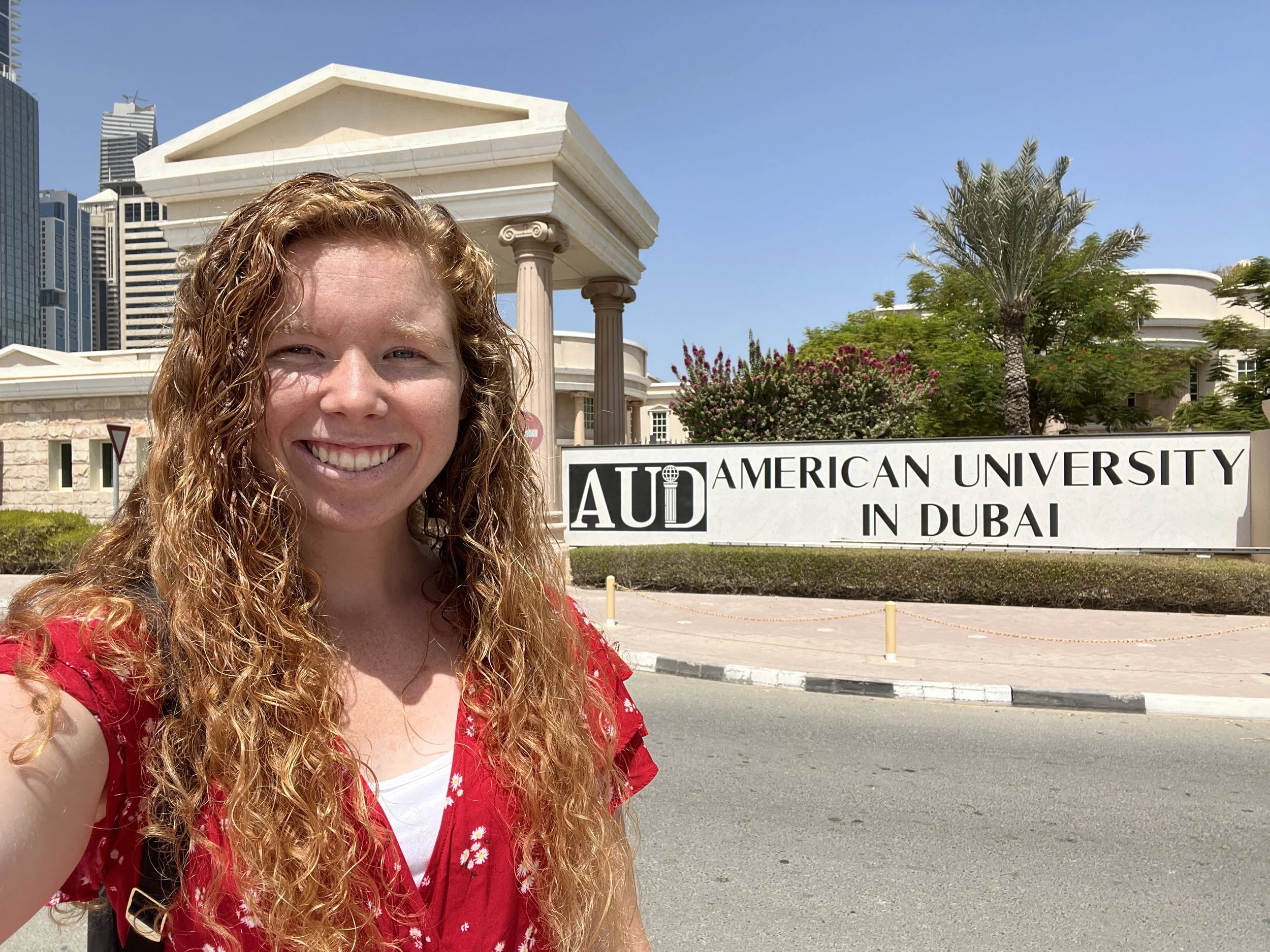"Going Green in Jordan: How to Recycle while in Amman" by Christian Bevilacqua
Banner Image: Recycling bin in a secluded corner in Amideast Jordan. Photo credit: Bevilacqua, 2023.
After just three weeks of studying and lounging in the cafes of Amman, Jordan you come to realize that the number of cups of coffee and tea that you are consuming is, well, sizable. This comes to attention not just through the astonishing dent in your bank account but it also presents itself through the sheer number of plastic and paper cups that you find yourself throwing away. While studying at Amideast every day the two (or more) teabags steeped and many plastic-wrapped snacks consumed create a lot of waste when they hit the rubbish bins. While at cafes, throwing away cups, and while eating at restaurants, tossing out shawarma and falafel wrappers, contribute to a steady amount of waste produced while meandering throughout Amman. One thing that has become apparent while in these spaces, though, is the lack of ability to recycle these products. Almost all restaurants, cafes, public buildings, and even my homestay, do not provide recycling bins or accessible recycling programs; only waste bins. Even on the streets, the large silver trash cans welcome trash disposable in public but do not grant the option to specifically recycle. The Amideast Education (American program) building has been the only building in Amman that I have seen a recycling bin. Though, this bin is for plastic water bottles only, and is small and not well advertised.
While in the U.S. I am used to recycling my paper and plastic products out of habit due to the consistent presence of specific recycling bins at my home institution and hometown. After hearing about the environmental sustainability initiatives being rolled out in a number of Arab nations over the past few years (namely the Gulf states; the United Arab Emirates) I was curious to see how waste management was carried out in Amman. Once on the ground here it became clear that although waste management is legislated in Amman, designated recycling bins are unavailable. With these observations I decided to turn to my peers at Amideast, my host family, and Jordanian friends to get their nuggets of knowledge and opinion on the subject matter.
Looking at Jordan’s national laws on waste management, it is clear that Jordan has implemented a strong means of waste collection, with state-led trash collection carried out throughout neighborhoods each week across the country. For each street a few large silver trash bins are provided by the state and trash collection is done weekly for free. Notably, specific bins for recycling are not provided and the throwing away of all waste is done in these public trash bins. However, according to the Jordan Times, since 2020 federal law has required waste management procedures to include the sorting of the rubbish collected from each neighborhood by municipal workers. Through this, paper, plastic, glass, and metals are sorted and recycled if possible. This move towards environmental sustainability has been celebrated by environmental conservation groups, and recent calls have been made to require separate recycling bins within public spaces to make sorting more productive.
While eating my first Big Tasty at McDonalds in Amman I asked my language partner “do you recycle?” I was met with a big laugh and a frank “we do not recycle here, or at least I don't know anyone that does.” I asked “why?” and was told that “it is just not common practice here yet, Jordan has not set up a large recycling system, so all trash goes to the same place.” I then asked him about the government-led sorting of garbage that is collected from neighborhoods each week. I was told that a large issue with sorting recycling from waste is that many Jordanians do not throw trash away with the intent for it to be recycled (bottles and cans are often not cleaned or are broken, and paper products are often too crumpled and ripped), so he is not confident that all the collected trash is viable for recycling. “I do hope that they do get sorted and recycled, though, inshallah.” When I asked my Arabic instructor if recycling is taught to her children in school, I was met with a similar stance: “We all are told to throw away our trash and if it can be recycled it might be. We are not taught other ways of recycling; it is not possible here.” My host father relayed the same sentiment, and my host sister, who lives in Dubai, the United Arab Emirates, noted that Jordan does not yet have a distinct recycling program like the Arab states in the Gulf are actively developing.
So, my note while in Jordan:
If you want to be more environmentally friendly while snacking at home, in restaurants, or in class, make sure to throw away your recyclable materials in a way that is easy to be sorted! For bottles or cans, make sure they are clean and not crushed! For paper products, try not to “Kobe” balls of paper into the trash or rip them up to ensure they can be recycled. It is important to recognize and respect the systems for recycling in new spaces, and for Jordan recycling is made easy through most of the work being done for you after trash collection!
Happy recycling! The gorgeous natural environment of Jordan will thank you later.
Christian is a student at Syracuse University and is studying abroad in Amman, Jordan on the Amideast Area and Arabic Language Studies Program during Spring 2023.






